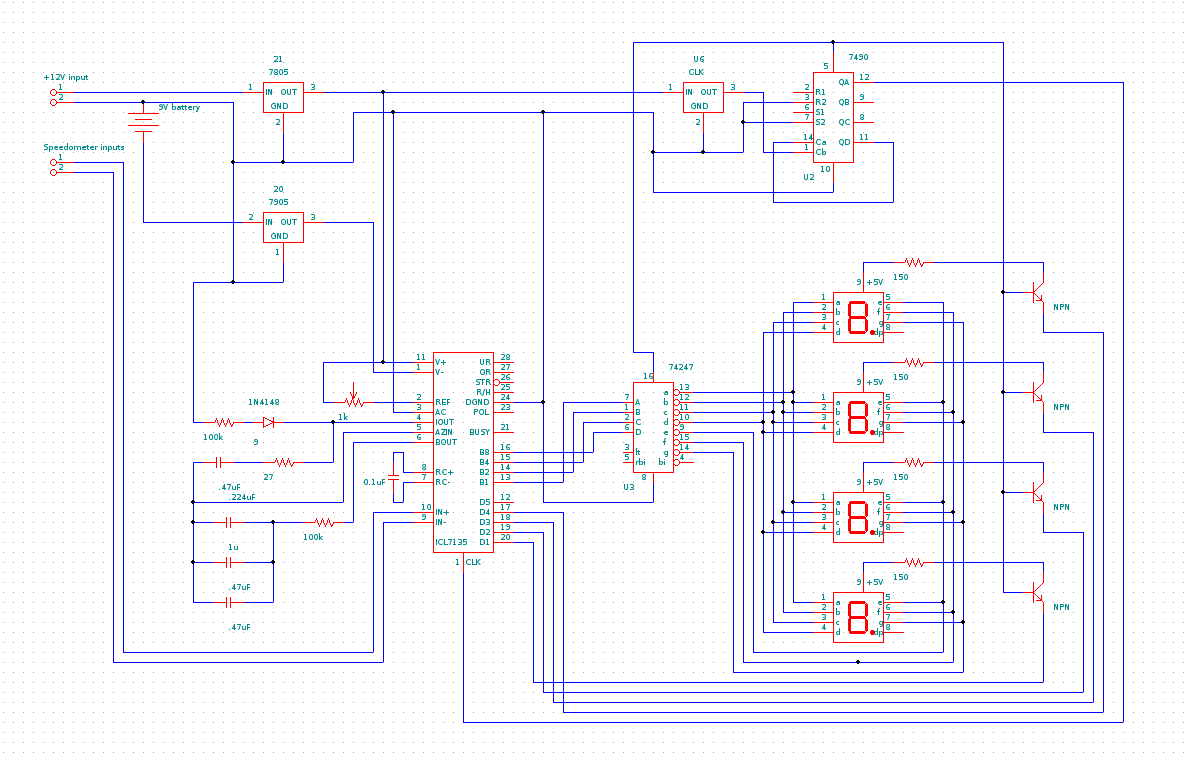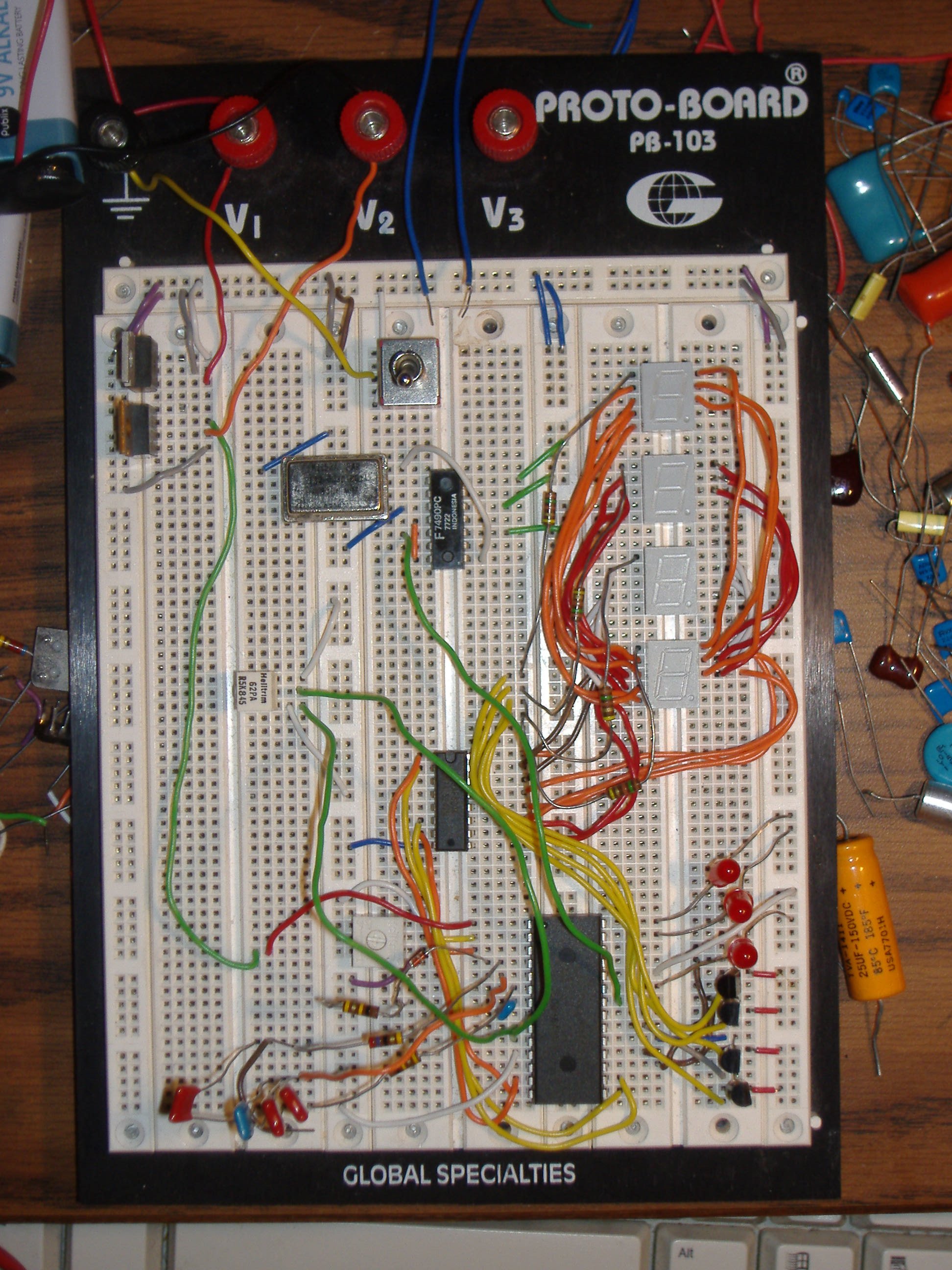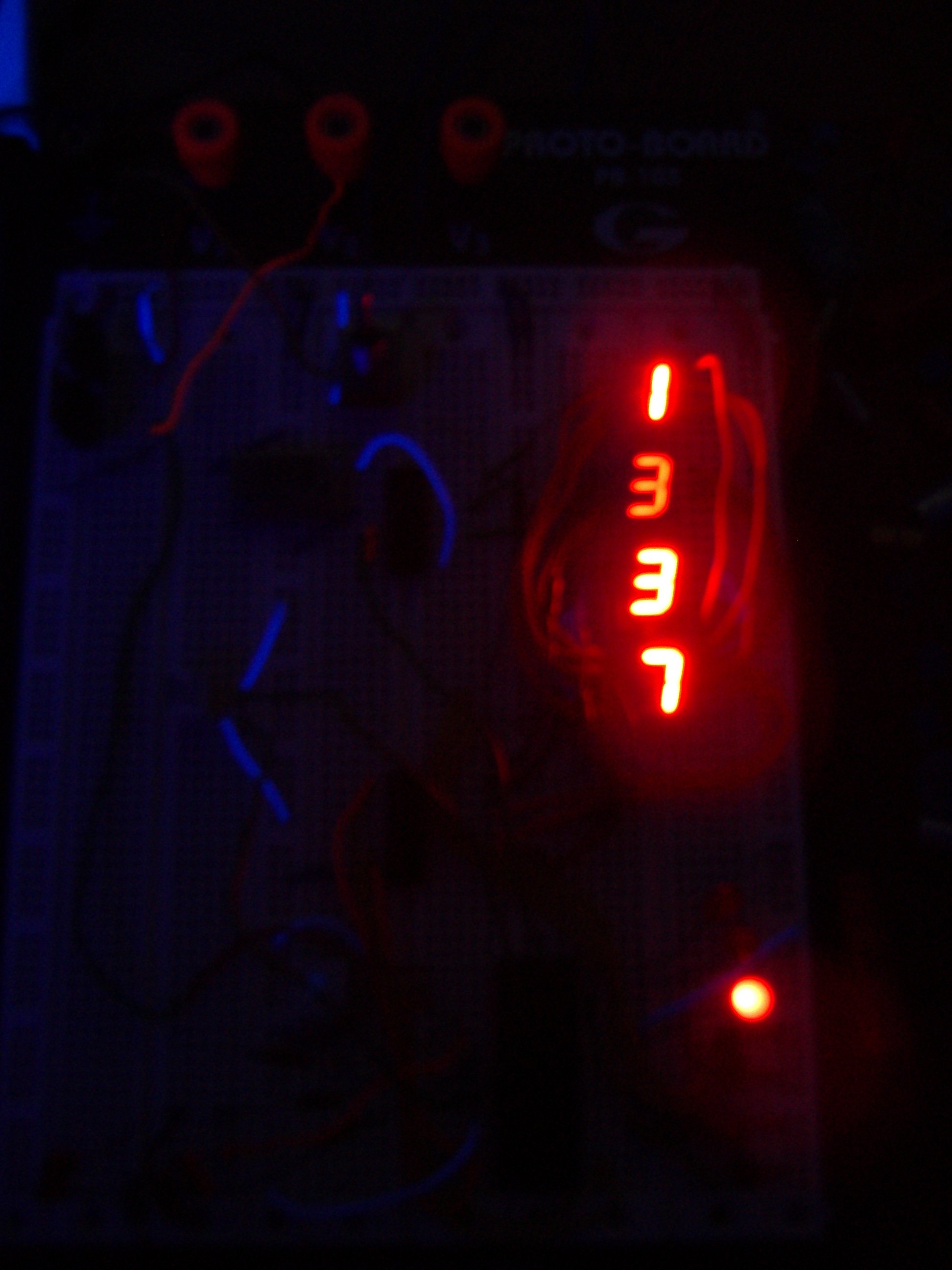 » Site Navigation » Site Navigation | | |  » Recent Threads » Recent Threads | 1999 M3 Swap 09-07-2023 10:10 PM 05-02-2024 08:18 PM 6 Replies, 329,683 Views | | | |  |  |  | |  08-17-2007, 05:40 PM 08-17-2007, 05:40 PM | #16 | | Junior Member Join Date: May 2007 Location: Atlanta, GA Posts: 26 | 
Quote: Originally Posted by John Firestone  2) use a low-cost ($5-10) DC to DC converter module to generate -5V from your regulated +5V supply (or -9V you can then regulate to -5V).
Personally, I would do neither and instead follow BMW's example: keep everything digital, attach a microcontroller to the instrument cluster's vehicle speed output, and have it count the output's +12V digital pulses, and show the speed. I might also build a Mach meter rather than a speed-of-light meter as I think you'll find passing the sound barrier is challenge enough.
Good luck! | That second suggestion is interesting, as I was unaware such parts existed. I may modify my power supply for it then. By the by, with a Mach meter, it's not easy to make relativity calculations.  Nonetheless, I finished a working prototype last night (only took me what... three months?). Here are some images to those whose curiosity may be piqued: A schematic:  The prototype on my breadboard:  And the meter in action:  At the moment, the power supplies are two 9V batteries, instead of one 9V and the car's power supply as I intend it to be in the end. Doesn't matter, though, as it's not in my car yet--just testing it on my desk. The only clock I could find is running at about 4.83MHz, which is too fast for the ICL7135, so I used a 7490 to take it down to 483KHz, which is sufficient. And for those wondering why the second digit is less bright, it's because the transistor I'm using to power it is either going bad or already bad. I need to find a new one. |  |  |  08-17-2007, 09:03 PM 08-17-2007, 09:03 PM | #17 | | Senior Member Join Date: Nov 2006 Location: Pittsburgh, PA Posts: 1,224 | 
Quote: Originally Posted by Igglybob  Oookay... I finally found some time. Let's begin. I'm not including basic details of how these circuits work; I'm simply sketching out what I saw to be your suggestions and showing you why it won't work.  Your suggestion. Here we have a successful +12V and -12V, but they must be isolated. In my situation, the grounds must remain the same. Here, if you connect the grounds (which are B and D), you short the battery, and everyone dies. If the grounds did not need to be the same (which unfortunately they do in this project) I could get away with that. larryn's solution is interesting, and might work, but I've set off on a different path so I'm not going to investigate that one. I find your attachments explanatory, but not helpful to this discussion as this is elementary to both of us. My solution in the end is this:  I don't like the fact that I have to use a battery, but it seems there isn't an easy way around it. My priorities here are size and simplicity; it needs to be as small as possible, and with 3 components this isn't too bad. Thanks to all for the help! | So pretty much you followed my suggestion. I don't think I ever suggested making a +12 and -12 source from a single voltage source. . . that would be impossible to keep the battery from shorting. In my example, there are always two voltage sources. Just like in your final design. The difference is I assume you have voltage sources at the levels that you want (which is want a regulator achieves). |  |  |  08-18-2007, 03:14 PM 08-18-2007, 03:14 PM | #18 | | Junior Member Join Date: May 2007 Location: Atlanta, GA Posts: 26 |
Well, perhaps I misunderstood what you wrote. Regardless, I have a solution now. Thanks for the help. |  |  |  08-18-2007, 05:39 PM 08-18-2007, 05:39 PM | #19 | | Senior Member Join Date: Mar 2005 Location: Portland Or Posts: 2,666 |
The most important thing is you all have show why a pure Digital track EE degree is limiting.
Nobody does analog anymore in college, thats why most power supply tech SUCKS these days, people just re-use old designs because nobody specializes in boring old analog electrical degrees. Too bad because most analog jobs pay better they just don't get the really cool computer toys....
Dave __________________
Dave - PDX
1995 318ti - Active Black and Tan.
2005 330xi - Mtech 1 - 6spd - Orient Blue/Black |  |  |  08-18-2007, 07:40 PM 08-18-2007, 07:40 PM | #20 | | Junior Member Join Date: May 2007 Location: Atlanta, GA Posts: 26 |
My problem is that I haven't yet taken the classes that would teach me the elegant "correct" way to do these. Unfortunately they're senior-level classes and I have to jump through many hoops before getting there. Hopefully I'll learn something in those classes and be a bit more competent afterwards. |  |  |  08-19-2007, 02:53 AM 08-19-2007, 02:53 AM | #21 | | Senior Member Join Date: Nov 2004 Location: Bremerhaven, Germany Posts: 977 |
Why wait? If you are training to be an engineer, I would learn these things on your own. Who knows, you might end up with a bad teacher and not be taught something useful or essential. Or worse, you might be mistaught. (Question authority!) Self-learning also is or will be excellent practice in your professional life. I have found that engineers who can not teach themselves are generally mediocre and unusually dull. Just to show that I am not talking complete nonsense, I am a digital/firmware guy but that doesn't keep me from learning what I needed to know to solve a problem and create things like this. |  |  |  08-19-2007, 05:02 AM 08-19-2007, 05:02 AM | #22 | | Member Join Date: Nov 2006 Location: Diego Posts: 73 |
this is a very interesting thread to me. evan if i dont understand much of it...  |  |  |  08-19-2007, 09:12 PM 08-19-2007, 09:12 PM | #23 | | Senior Member Join Date: Nov 2006 Location: Pittsburgh, PA Posts: 1,224 | 
Quote: Originally Posted by pdxmotorhead  The most important thing is you all have show why a pure Digital track EE degree is limiting.
Nobody does analog anymore in college, thats why most power supply tech SUCKS these days, people just re-use old designs because nobody specializes in boring old analog electrical degrees. Too bad because most analog jobs pay better they just don't get the really cool computer toys....
Dave | There is no such thing as a pure digital track EE. In fact, EE is so broad, you barely pick up enough depth in any one field with just a bachelors degree. Igglybob, I agree with John, don't wait till you encounter stuff in class, now is the time to start experimenting. BTW, your design is 'elegant' enough. None of your classes will involve PCB design or really anything surfacemount. If you plan on making more boards for your car and other things, you'll have to investigate that on your own. There may be classes, but you'll need to sacrifice free electives or just take additional classes. For my Masters thesis in EE, I had nearly zero classwork in the subject matter. Most of my experience which aided me in netting my current job came from all the work I did on my own building and programming robots, participating in competitions, and using all the chances I had at choosing electives and grad coursework to take courses in embedded systems and control systems. The regular EE program will make you an OK engineer. But to be really good, you need to go the extra mile, and I think you're on a great start BTW. And trust me, it will be a lot of fun. Grr. . .I always ramble on when I'm on this subject, you won't believe how often it comes up. . . School is great at teaching EE theory. All good students can learn theory and do well in class. But, you quickly learn that theory is based on a lot of ideal situations and the real world is different. In grad courses, you start to learn to deal with these problems. But anyway, the reason I say this is that the best teacher is experience. In your coursework, you won't be designing circuits beyond what is the in book, you won't be solving problems that don't already have solutions. But, by going out and working on your own projects, you're opening yourself up to the real creative thinking that makes an engineer an engineer. After giving us a couple test problems which were close to being totally different from anything we'd covered in class before, one of my teachers said to me (because she knew I was going on to do a PhD, and I'm paraphrasing here) - There is no point in demonstrating you can solve problems similar to the ones in the book. Those problems have already been solved by someone else. What sets people apart, those who are capable of conducting new and insightful research, from those who cannot, is the ability to apply those basics you have learned in class, to previously unsolvable problems, or even to discover solutions to problems that previously did not exist. I've learned both from observation and very hard personal experience, your ability to achieve this depends on making yourself go beyond the book. Working on my own projects outside of class really helped in that regard. . so has working fulltime. LoL. . .you can see this is a topic I like to talk about. . .I was even quoted in the July edition of Embedded.com's Embedded Systems Mag on a very similar topic. Anyway, keep up the good work! |  |  |  08-19-2007, 09:22 PM 08-19-2007, 09:22 PM | #24 | | Junior Member Join Date: May 2007 Location: Atlanta, GA Posts: 26 |
Well, of course, I do a lot of experimenting on my own time. I find, though, that in class, I tend to learn the "correct", or at least, the more standard way of doing things. I suppose that's really more of the whole peer review thing, where other people have come up with better solutions over the year that I never managed to unearth in my experimentation and research. I'd post an example... but I can't think of any right now.
By the way, if anyone actually looked at the schematic and has any suggestions, let me know. I think I've done everything a decent manner, but I'm not 100% sure. |  |  |  | |
| Currently Active Users Viewing This Thread: 1 (0 members and 1 guests) | | |
 Posting Rules Posting Rules | You may not post new threads You may not post replies You may not post attachments You may not edit your posts
HTML code is Off
| | |
|

